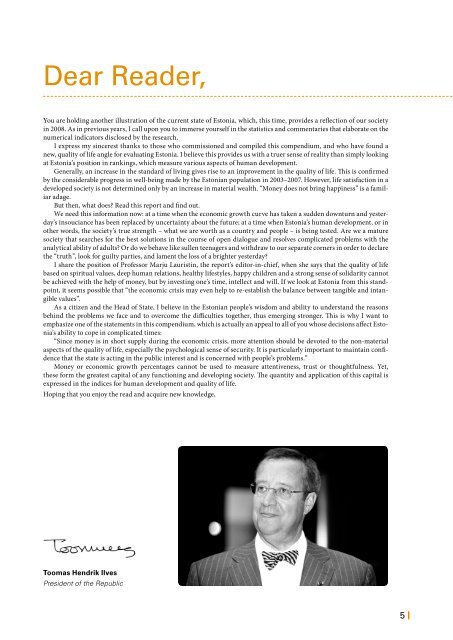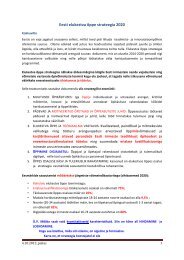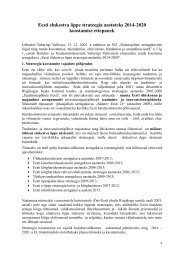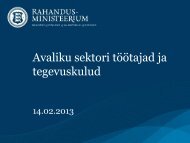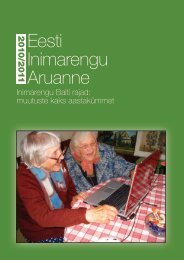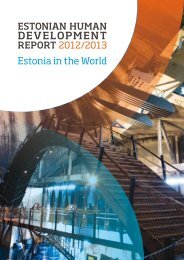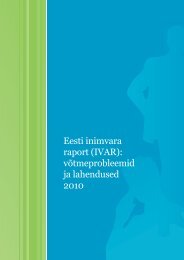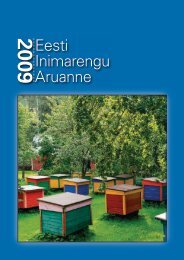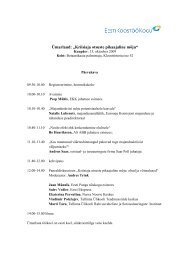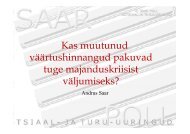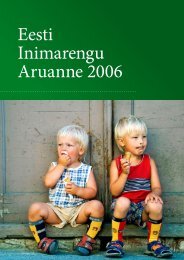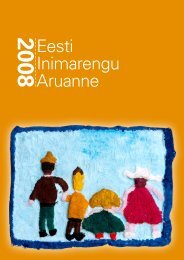Estonian Human Development Report
Estonian Human Development Report - Eesti Koostöö Kogu
Estonian Human Development Report - Eesti Koostöö Kogu
You also want an ePaper? Increase the reach of your titles
YUMPU automatically turns print PDFs into web optimized ePapers that Google loves.
Dear Reader,<br />
You are holding another illustration of the current state of Estonia, which, this time, provides a reflection of our society<br />
in 2008. As in previous years, I call upon you to immerse yourself in the statistics and commentaries that elaborate on the<br />
numerical indicators disclosed by the research.<br />
I express my sincerest thanks to those who commissioned and compiled this compendium, and who have found a<br />
new, quality of life angle for evaluating Estonia. I believe this provides us with a truer sense of reality than simply looking<br />
at Estonia’s position in rankings, which measure various aspects of human development.<br />
Generally, an increase in the standard of living gives rise to an improvement in the quality of life. This is confirmed<br />
by the considerable progress in well-being made by the <strong>Estonian</strong> population in 2003–2007. However, life satisfaction in a<br />
developed society is not determined only by an increase in material wealth. “Money does not bring happiness” is a familiar<br />
adage.<br />
But then, what does? Read this report and find out.<br />
We need this information now: at a time when the economic growth curve has taken a sudden downturn and yesterday’s<br />
insouciance has been replaced by uncertainty about the future; at a time when Estonia’s human development, or in<br />
other words, the society’s true strength – what we are worth as a country and people – is being tested. Are we a mature<br />
society that searches for the best solutions in the course of open dialogue and resolves complicated problems with the<br />
analytical ability of adults? Or do we behave like sullen teenagers and withdraw to our separate corners in order to declare<br />
the “truth”, look for guilty parties, and lament the loss of a brighter yesterday?<br />
I share the position of Professor Marju Lauristin, the report’s editor-in-chief, when she says that the quality of life<br />
based on spiritual values, deep human relations, healthy lifestyles, happy children and a strong sense of solidarity cannot<br />
be achieved with the help of money, but by investing one’s time, intellect and will. If we look at Estonia from this standpoint,<br />
it seems possible that “the economic crisis may even help to re-establish the balance between tangible and intangible<br />
values”.<br />
As a citizen and the Head of State, I believe in the <strong>Estonian</strong> people’s wisdom and ability to understand the reasons<br />
behind the problems we face and to overcome the difficulties together, thus emerging stronger. This is why I want to<br />
emphasize one of the statements in this compendium, which is actually an appeal to all of you whose decisions affect Estonia’s<br />
ability to cope in complicated times:<br />
“Since money is in short supply during the economic crisis, more attention should be devoted to the non-material<br />
aspects of the quality of life, especially the psychological sense of security. It is particularly important to maintain confidence<br />
that the state is acting in the public interest and is concerned with people’s problems.”<br />
Money or economic growth percentages cannot be used to measure attentiveness, trust or thoughtfulness. Yet,<br />
these form the greatest capital of any functioning and developing society. The quantity and application of this capital is<br />
expressed in the indices for human development and quality of life.<br />
Hoping that you enjoy the read and acquire new knowledge,<br />
Toomas Hendrik Ilves<br />
President of the Republic<br />
|


